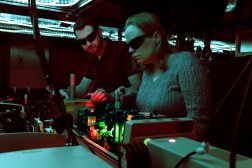Lawmakers aim to establish DOD pilot focused on near-term quantum computing applications

Members of the House Armed Services Committee want to create a new pilot program within the Pentagon geared toward quantum computing solutions that are capable of being developed and deployed in two years or less.
Section 218 of the HASC Subcommittee on Cyber, Information Technologies and Innovation mark of the fiscal 2024 National Defense Authorization Act, released Monday, would direct the Pentagon to partner with a federally funded research and development center (FFRDC) and the quantum industry on the effort.
“Under the pilot program, the Secretary of Defense … shall— (1) convene a group of experts and organizations to identify challenges faced by the Department of Defense, including the Armed forces, that have the potential to be addressed by quantum and quantum-hybrid applications;(2) develop and deploy demonstrations, proofs of concept, pilot programs, and other measures to address the challenges identified … using quantum and quantum-hybrid applications; (3) ensure that any quantum or quantum-hybrid application based solutions identified under the program are capable of development and deployment in 24 months or less; (4) assess and utility of commercial quantum and quantum-hybrid applications for meeting the near-term needs of warfighters; and (5) seek to build and strengthen relationships between the Department of Defense and nontraditional defense contractors … in the technology industry that may have unused or underused solutions to specific operational challenges of the Department relating to quantum and quantum-hybrid applications,” the mark states.
Broadly, quantum information science encompasses the investigation and application of complex phenomena happening at atomic and subatomic levels to process and transmit information. It is one of Undersecretary of Defense for Research and Engineering Heidi Shyu’s 14 “critical technology areas.”
Military applications include quantum computing and quantum networks, atomic clocks and quantum sensors, according to the Pentagon.
“Quantum computing can provide unprecedented computational speeds and help solve the Department’s hardest analytical problems. Quantum sensors promise the ability to provide unprecedented accuracy in position, navigation, and timing. From more accurate information to faster decision making, to significantly stronger encryption capabilities, quantum science has the promise to deliver cutting-edge technology,” per the DOD chief technology officer’s website.
The subcommittee mark defines ‘‘quantum and quantum-hybrid applications’’ as “algorithms and applications which use quantum mechanics through quantum processing units, including— (A) quantum-classical hybrid applications which are applications that use both quantum computing and classical computing hardware systems; (B) annealing and gate systems; and (C) all qubit modalities (including super conducting, trap ion, and photonics).”
The three-year pilot would have to kick off no later than March 1, 2024. The Pentagon would be required to brief lawmakers by that date, to include identifying the FFRDC and any private-sector entities the department has partnered with for purposes of carrying out the program and describing plans for developing and operating it.
The legislative proposal would also require annual reports with an update on the status of the pilot, including a description of the problem sets and capabilities that were evaluated by DOD organizations; an explanation of whether and to what extent the program resulted in the identification of potential solutions based on quantum and quantum-hybrid applications; any potential barriers to the use of quantum and quantum-hybrid applications to solve near-term problems for the U.S. military; and recommendations regarding how the Pentagon can better leverage and deploy quantum and quantum-hybrid applications to address near-term military applications and operational needs.
Meanwhile, the Office of the Secretary of Defense is requesting $75 million in fiscal 2024 for a new initiative called Quantum Transition Acceleration that’s intended to speed up the operationalization of quantum devices for military purposes and mature U.S. supply chains underpinning the development of emerging quantum technologies. Additionally, the department projects that it will ask lawmakers for $100 million per year in the fiscal 2025-2028 time frame to continue to advance these efforts.
The subcommittee is scheduled to mark up the policy bill on Tuesday.






